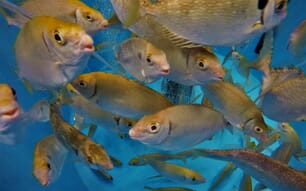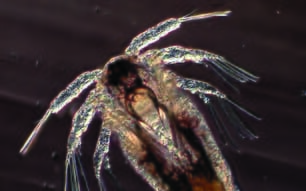
The Oyster Aquaculture Training programme, or OAT, is the brainchild of professor Stan Allen, Director of the Aquaculture Genetics and Breeding Technology Center (ABC) at VIMS.
Allen established the programme, which welcomed its first four trainees in April, to help provide private oyster farmers with workers who are skilled in oyster husbandry in the hatchery and field. ABC staff, principally Karen Hudson and Amanda Chesler, crafted programme specifics. The programme is funded by an anonymous private donor.
Allen says the programme’s goal “is to provide Virginia’s expanding aquaculture industry with trained technicians using a pool of local, interested people.”
Current trainees are Elisabeth Bloom of Hayes, Ben Clark of West Point, Tommy Camp of Williamsburg, and Lisa Domalewski of Virginia Beach. The group ranges from 18- to 25-years old, and includes two college biology majors, a “life-long naturalist,” and a recent high-school graduate.
A 2008 survey by the Sea Grant Marine Advisory programme at VIMS shows a steady growth of oyster aquaculture in Virginia as watermen shift from the traditional planting of “shell on bottom” to farming using cages, racks, and floats. The number of farmed oysters nearly tripled between 2005 and 2006, and growers predicted a 33 per cent increase during the most recent growing season, which would bring the number of farmed oysters to 25,000,000. There was a 6-fold increase in sales of farmed oysters by Virginia growers between 2005 and 2007 (from 843,000 to 4.8 million), and growers expected sales of farmed oysters to reach 7.3 million in 2008.
Although the survey shows that employment figures for Virginia’s oyster aquaculture industry declined between 2006 and 2007, Allen expects job numbers to resume their upward climb as the market grows and hatchery capacity increases. A shortage of oyster seed from existing hatcheries currently limits the growth of aquaculture in the Commonwealth.
During the six-month OAT programme, the four trainees will work with VIMS researchers to learn all aspects of oyster farming, from hatchery production to grow-out. Karen Hudson, Research Coordinator at ABC, says “participants will be learning and working alongside researchers during our oyster hatchery season from April to September. The programme started with two-week rotations in each area of ABC: hatchery, algae culture, lab, and field.”
By exposing trainees to various styles of aquaculture, the programmeme hopes to give a broad perspective and appreciation for flexibility in methods of culture. “Growing oysters for research is not necessarily the modus operandi of commercial producers,” says Allen. “By the end of the programme, trainees will have a broad understanding of oyster aquaculture and will have gained the skills needed to perform tasks in both oyster hatchery and field operations.
Allen notes that the programme also benefits his own research operations by "providing seasonal help for the busiest time of the year in the VIMS research hatchery."
Further Reading
| - | Go to our previous news item on this story by clicking here. |




